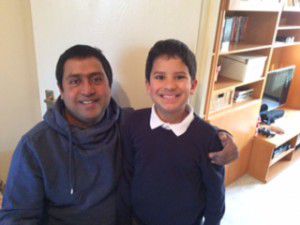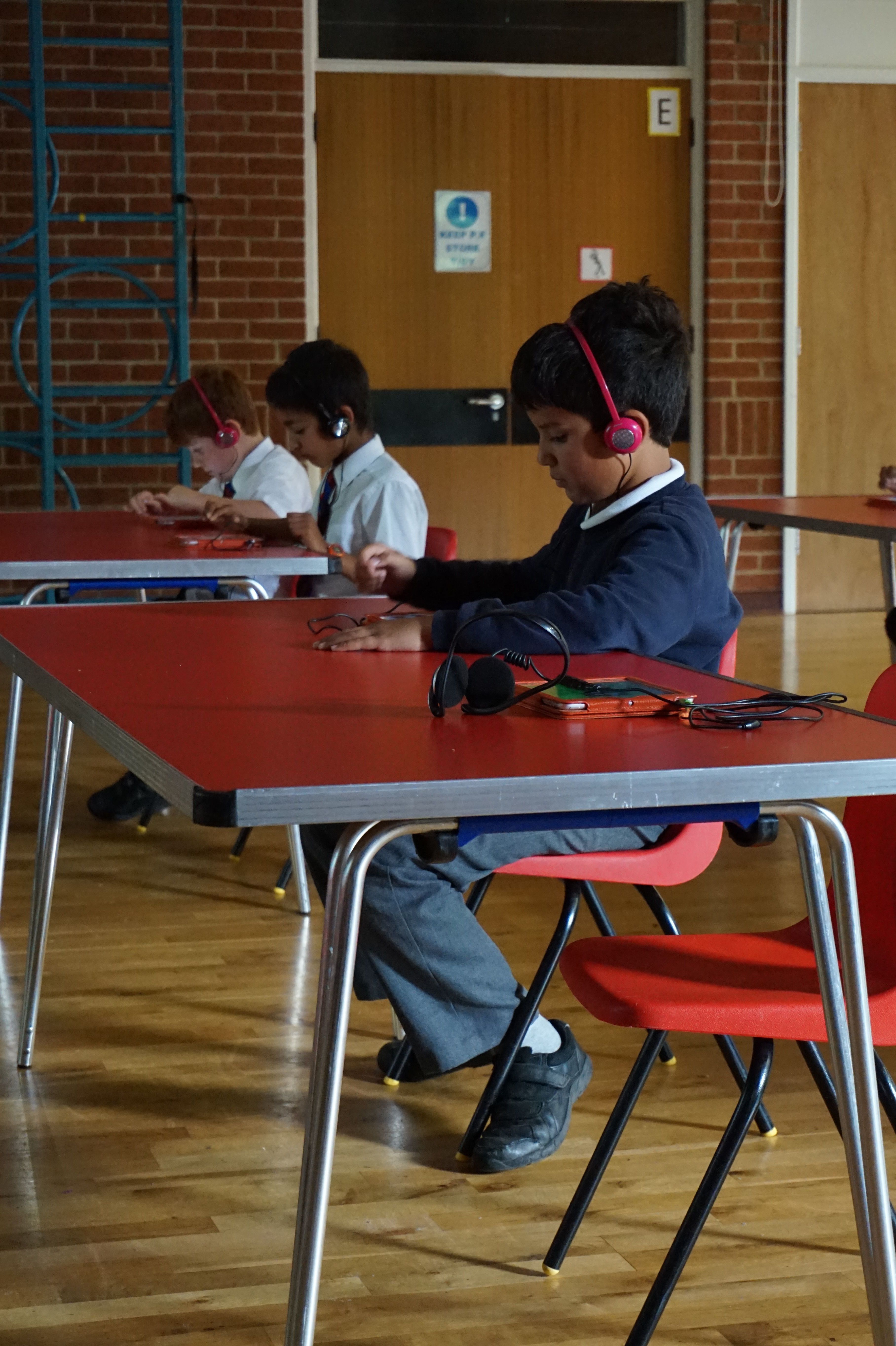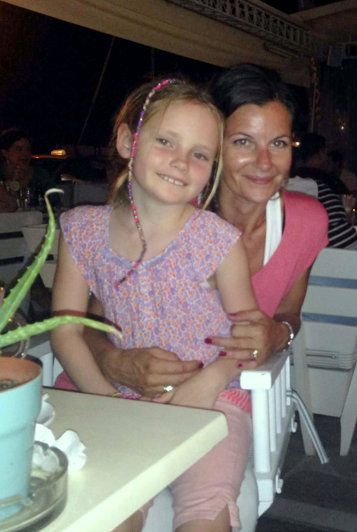Junior Language Challenge: fun for the whole family!
Isobel Eason from Hartlepool qualified for the Junior Language Challenge final two years in a row, and came third last year, with her proud family cheering her on. Here her mum Vickie shares their experience of the competition…
If you’re a parent or teacher of children aged 10 and under in the UK, visit juniorlanguagechallenge.com to find out more about our annual competition, which is now open! Entry costs just £5, which is all donated to our fantastic charity, onebillion.
The Junior Language Challenge has been an amazing experience from start to finish. My daughter Isobel thoroughly embraced the challenges and new languages that it offered.
Isobel qualified for the final in each of the last two years. The first year was a daunting experience but being one of the youngest to qualify that year did not put her off. As a family we all learnt along with her, even creating songs and rhymes to help her learn some of the trickier phrases. We sometimes still all sing them on the way to school on a morning whenever something reminds us of the languages she studied. She did really well in the final that year, finishing just outside the top 15.
The following year was a different story for Isobel. We noticed a real difference in the way she approached learning the new languages and every spare minute she had she spent practising. Mandarin has to have been one of her favorites. The final was very different as we all knew what to expect. I was dreading the leaderboard the most, it’s horrible to see the children moving up and down and I don’t know how Isobel managed to block it out. We were overjoyed when she made the final round, though we spent the entire final on the edge of our seats! I was so nervous for her but she was amazing, and her face when she had finished and looked at the scoreboard was an absolute joy. She had finished third! All of her hard work and determination had paid off.
I was amazed throughout at how quickly she picked up the different languages. The JLC and their fantastic team of people has provided Isobel with an invaluable experience, learning six languages over the last two years whilst also supporting the very worthy onebillion charity. It’s been an adventure that none of us will ever forget and one that we can’t recommend highly enough.

Counting the days: Reuben can’t wait for his 4th Junior Language Challenge
In today’s blog post, father and son Joseph and Reuben share with us their JLC story and how learning made fun got them counting the days until this year’s competition.
If you’re a parent or teacher of children aged 10 and under in the UK, visit juniorlanguagechallenge.com to find out more about our annual competition, which opens on Friday 11th March.
Reuben was just 6 and in Year 2 when a teacher with a passion for languages opened the JLC to this year group for the 1st time. Reuben got stuck in to learning Spanish, then Greek, breezed past most of the school including the Y6s and in to the East-Midlands’ semi-final. He came 4th. This was an inspiration to the other children that left them waiting for the next JLC. His success justified an early introduction of Abbey Road children to the exciting challenge of learning a new language. The sheer passion and excitement with which he approached the languages, the colourful child-friendly software and the brain-teasing range of games that increased in difficulty as his competence increased and introduced the language as it might be used in every-day life, kept him glued to learning, so much so that he was at it during every waking moment. For once, we parents did not have to battle with him to get off his game console or the iPad! Most importantly he remains as enthusiastic and motivated several challenges on.
 Reuben waited eagerly for his next shot at the JLC in Year 3. While the 1st round was a doddle for him, he crashed ignominiously out of the semi-final, learning an important life lesson, that there is no substitute for hard work. Rather than letting this get him down, he worked very hard and consistently in Year 4, at gaining a working knowledge of Portuguese, then Mandarin and qualified for the final in London. He was very excited and enthused by his success and immersed himself in learning Arabic for this. The fierce competition did not deter him but rather spurred him on and he came 13th after a hard fought set of heats.
Reuben waited eagerly for his next shot at the JLC in Year 3. While the 1st round was a doddle for him, he crashed ignominiously out of the semi-final, learning an important life lesson, that there is no substitute for hard work. Rather than letting this get him down, he worked very hard and consistently in Year 4, at gaining a working knowledge of Portuguese, then Mandarin and qualified for the final in London. He was very excited and enthused by his success and immersed himself in learning Arabic for this. The fierce competition did not deter him but rather spurred him on and he came 13th after a hard fought set of heats.
Having enjoyed himself so much and coming within a hair-breadth of winning, he continues his JLC journey. He cannot wait for this year’s challenge to begin. He is counting the days!
Joseph Chandy
___
I started the Junior Language Challenge in Year 2 at the age of 6 and have taken the Challenge every year since then. It is an amazing experience that I look forward to.
I love languages and was extremely interested in participating. I loved the way the games were laid out. This makes them really easy to understand and play and most importantly, it makes the whole experience really fun. No matter how hard the language is or may seem, EuroTalk makes it easy to learn and understand.
JLC combines two extremely important things in life, having lots of fun and language learning. It’s definitely not boring; it’s one of the best and most exciting experiences you can have. I love the competition it creates; the urge to win in all competitors is great. One of the things I love about the JLC is how you can share the massive excitement and competitiveness with other people who are also in the challenge. I strained to be at the top of the scoreboard, competing with my friends Adam and Farah Akbar and many others.
 Getting to the semi-final and final is a special feeling I will never forget. The feeling that you’re among the best of the massive amount of participants is simply amazing. The best thing is, the entrance fee is only £5 and it goes to an absolutely wonderful cause, a non-profit organisation called onebillion, whose sole aim and cause is to give the children in Malawi a better education and a much brighter future.
Getting to the semi-final and final is a special feeling I will never forget. The feeling that you’re among the best of the massive amount of participants is simply amazing. The best thing is, the entrance fee is only £5 and it goes to an absolutely wonderful cause, a non-profit organisation called onebillion, whose sole aim and cause is to give the children in Malawi a better education and a much brighter future.
I hope that more people can join the Junior Language Challenge and share this brilliant experience. I love the Junior Language Challenge and I will never forget it. JLC 2016 is a few mere days away!
Reuben Chandy
Junior Language Challenge finalist Grace aiming for the top in 2016
Jenny’s daughter Grace was a finalist in the 2015 Junior Language Challenge – and one of the stars of our video from the day! In today’s blog post, Jenny tells us about her experience of the competition as a mum, and what taking part in the JLC has meant to Grace.
 The JLC has become a very big part of our life since March 2014, when my daughter first entered the challenge.
The JLC has become a very big part of our life since March 2014, when my daughter first entered the challenge.
I was amazed by the commitment she put into the challenge, especially as she was only 7 at the time. She practised daily with her Daddy and it became a really fun part of the day. Even though she was ‘learning’, she didn’t/doesn’t class it in the same way as homework.
Grace got through to the semi-finals in Cambridge. She was so very nervous and had no idea what to expect (similarly to myself!). She completed the first round and got through to the final 12. It was this round I sat in to watch, oh my goodness… It was nerve wrecking watching the scores go up and down. Unfortunately Grace didn’t make it through to the final that year. She wasn’t too downbeat about it and declared she would do better next time! I wasn’t sure my nerves could stand another one!
March 2015 came and Grace started the challenge again. Proudly, she got through to the semi-finals and this time she came top in the final 12, so she was through to the Grand Final at Olympia! To us, this was an amazing achievement and we were so proud.
On the day she made it through to the last round but only came 10th. Although, only 10th at the age of 8 from thousands of entrants is fairly epic for us all. The JLC team were fabulous throughout the trials, very reassuring and putting the children at ease.
Grace is determined to make the top three in the finals this autumn!
I cannot speak highly enough of the JLC and would thoroughly recommend all parents let their child experience this modern way of learning a language. It is a fun and challenging game with only positive results. So, as we commence the new challenge with Romanian, Grace reiterates her desire to make the Grand Final! Fingers crossed!
Good luck to Grace and everyone who takes part in this year’s JLC, which will launch on March 11th and is open to children aged 10 and under across the UK. Entry costs just £5 and is donated to our charity onebillion. The first of our three languages this year will be Romanian!
You can find out more about Junior Language Challenge 2016 on our official page: juniorlanguagechallenge.com. Or email jlc@eurotalk.com if you have any questions.


